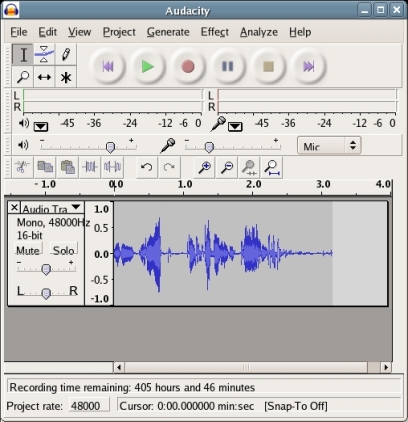
VoxForge

VoxForge
First make sure your microphone volume in Audacity is set to 1.0. Then click Record (i.e. the red circle button) and begin speaking in your normal voice for a few seconds, and then click Stop (i.e. the yellow square button).
Look at the Waveform Display for the audio track you just created (see image below). The Vertical Ruler to the left of the Waveform Display provides your with a guide to the audio levels. Try to keep your recording levels between 0.5 and -0.5, averaging around 0.3 to -0.3. It is OK to have a few spikes go outside the 0.5 to -0.5 range, but avoid having any go beyond the 1.0 to -1.0 range, as this will generate distortion (see image):

If you have increased your volume in Audacity to the maximum and still are not getting an acceptable sound level in your recording, you may need to either increase the volume settings or turn on the 'Mic Boost' switch in your Windows Master Volume Control utility. This utility located in the Start>All Programs>Accessories>Entertainment menu, and is called "Volume Control".
The Windows Master Volume Control utility controls the volume settings for many things on your PC. Scan across the window and look for your Microphone volume control slider.
|
If your Microphone volume control is not showing up in the "Master Volume" window, click Options>Properties, and select Adjust volume for "Playback" button and select the Microphone box in the "Show the following volume controls:" selection list. Click OK. If your Advanced button is not showing up under your Microphone Volume Control, click the Options>Advanced Controls selection. |
Click the 'Advanced' button under the Microphone Volume Control (see image below):
and then select the '1 Mic Boost' box (see image below):
Hit the ctrl-z key in Audacity (to 'undo' your previous recording) and try recording again.
If the waveform display on your track beyond the 1.0 to -1.0 range (i.e. the waveforms have been clipped off at the top or bottom) your volume is too high. Reduce it with Audacity's microphone volume control, and hit ctrl-z in Audacity and try again. It is better to err on the side of having a lower volume level from a speech recognition perspective - clipped speech sounds distorted.
Once you are satisfied that the volume is acceptable, try playing the file back by clicking Play (i.e. the green triangle button) in Audacity. You will likely need to adjust the Master Volume for your speakers in your Windows 'Master Volume' utility in your Volume Control utility (see image above).
You need to hear your utterances after each recording to make sure they sound OK (i.e. to make sure there are no non-speech noises - like breathing noises). Make sure that your speakers are turned off when you are recording. Hit ctrl-z in Audacity to remove the track you just created.
I am using a Logitech headset mike with the plug ins, not USB. The volume is fine with these when I work on the phone using Pamela with Skype, but not on Audacity. And the wave forms stay just above the vertical line, no going within the .05 range as it used to.
Nearly every query of this nature probably arises from the problem I had that when using the microphone or 'line in' input on a PC sound card, the level was too low to be audible.
After checking the usual problems such as wrong input selected, or input volume, it is highly likely that your sound card doesn't have sufficient amplification power to ensure the recording level is sufficient for your needs. You will need to purchase a pre-amp (starting at £25 in the UK) and you will need to have the pre-amp between the microphone and the PC.
is this how you would always recommend recording with this 2 step process or would you ever record without compressing at a higher volume to begin with? the final output should always max our around the yellow, correct? thanks!